DAVID BRENNAN
In an exclusive interview with Newsweek, Ukraine's ambassador to the UK Vadym Prystaiko says there is an "unhealthy" obsession with his nation's planned counteroffensive this spring.
Prystaiko believes Russia will be content to maintain the land bridge to Crimea it has secured following its February 2022 invasion.
Fighting, he says, will be difficult for Ukraine as it has not received all of the weapons it needs from Western allies.
But even if Ukraine temporarily fails to take back territory lost to Russia, there is a "beauty" that few see to have survived and pushed back against Moscow's violent offensive, Prystaiko said.
Ukraine will have to reverse significant Russian achievements in a coming spring counteroffensive that could prove both militarily and politically pivotal, Kyiv's representative in London has said.
Ambassador Vadym Prystaiko—Ukraine's former foreign minister, ambassador to Canada, and top representative at NATO—told Newsweek in an interview at Kyiv's mission in the British capital that Western allies are simultaneously overly focused on Ukraine's planned spring operation, while also not doing enough to ensure its success.
Ukraine and its foreign partners, Prystaiko said, risk playing into the hands of President Vladimir Putin, who is looking to break the West's will and freeze the conflict while his troops are still in possession of contiguous swathes of invaluable Ukrainian territory.
"The whole importance of the counteroffensive, all the hopes we put on this—this is very unhealthy," Prystaiko said. "If anything goes wrong, or it's not successful enough—and what is enough?—people will have all these excuses. They will say they knew that was going to happen, and now we must get to the table and negotiate something."
Russian troops, meanwhile, are sitting on significant spoils of war. "You can argue that they achieved a lot," Prystaiko said. "That's why they can negotiate now."
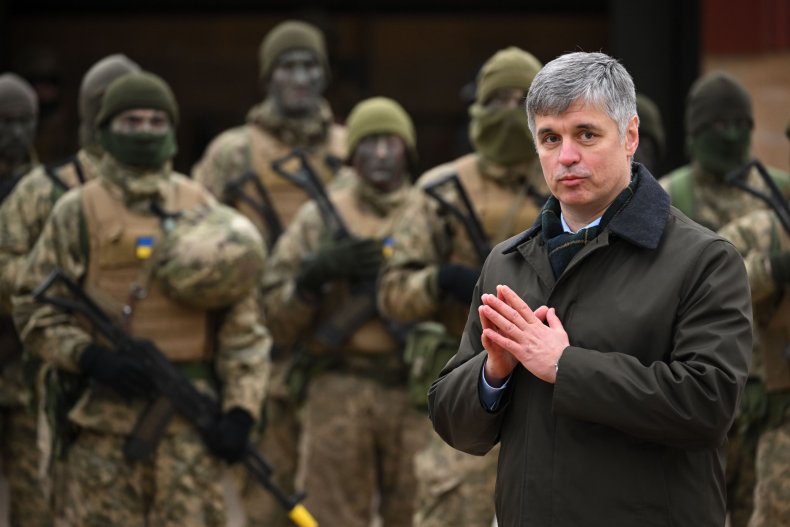 Vadym Prystaiko, Ukraine's ambassador to the U.K., speaks to Ukrainian soldiers undergoing training near Salisbury, U.K., on February 23, 2023. He says Russia has achieved a lot with its invasion of Ukraine.FINNBARR WEBSTER/GETTY IMAGES
Vadym Prystaiko, Ukraine's ambassador to the U.K., speaks to Ukrainian soldiers undergoing training near Salisbury, U.K., on February 23, 2023. He says Russia has achieved a lot with its invasion of Ukraine.FINNBARR WEBSTER/GETTY IMAGES"Negotiations will mean that Ukraine will have to look to the 'low-hanging fruit.' You don't have to be a genius to understand what will be asked of us: at least Crimea."
Russia's gambit to seize Kyiv and collapse President Volodymyr Zelensky's administration failed spectacularly. Moscow is believed—by Western and Ukrainian military officials—to have suffered hundreds of thousands of casualties in nearly 14 months of combat, during which time its much-vaunted troops have scored few major victories and been forced into multiple humiliating retreats.
But Ukraine, too, has suffered. The country's existential struggle is thought to have cost at least tens of thousands of lives, its economy has been devastated, 14 million people have been displaced—eight million abroad—and almost 20 percent of its total landmass occupied.
The Crimean Question
If the fighting stopped now—as some leaders including Chinese President Xi Jinping and Brazilian counterpart Luiz Inácio Lula da Silva are urging—Russia would retain control of a land bridge of occupied territory stretching from its borders to the Crimean peninsula. This, Prystakio said, still constitutes success for the Kremlin.
How Ukraine can force Putin's hand with a Crimea blockade
"Now they are at a historic point," he said. "They wanted this, and they have it. Obviously, the Kerch Strait Bridge cannot serve 2 million-plus people," he added, referring to the bridge connecting Crimea to Russia that was built after Moscow annexed the peninsula in 2014.
"Obviously, geographically it has no connection to the Russian Federation. They needed water, and they needed a big electricity station which will supply the whole region."
"I said from the very beginning, that's what Russia actually wanted and why they would have attacked us," the ambassador added. "They might not have gone all the way in [to Kyiv]. They actually did, because they saw the opportunity. But they didn't have to."
Prystaiko—who was instrumental in the negotiation of the Minsk accords that temporarily put an end to fighting after Russia's annexation of Crimea and invasion of parts of eastern Ukraine—said nine years of war in the east might be serving as a "diversion" to retain Crimea.
"All of this eastern campaign, it could be just one big diversion from Crimea, a purely racketeering move," the diplomat said. "It just might be that the Russians will be satisfied with the Crimea peninsula."
Zelensky's government has made clear there is no hope of renewed peace talks while Russians remain on Ukrainian territory. Military planners in Kyiv will be hoping that the coming offensive sets the stage for a Russian collapse and Ukrainian victory later this year, though all signals from Moscow indicate Putin is settling in for a long war.
"We cannot negotiate with these people," Prystaiko said, recalling his own experience of dealing with Russian envoys during the Minsk peace process "All the cards are on the table right now."
Crimea—the jewel in Putin's neo-czarist crown—could prove a trump card. Zelensky has said the war will end on the occupied peninsula, while Russian officials have threatened a nuclear response to any assault there. Russian forces are busily building new fortifications there while Western officials express skepticism that Kyiv is capable of liberating the peninsula.
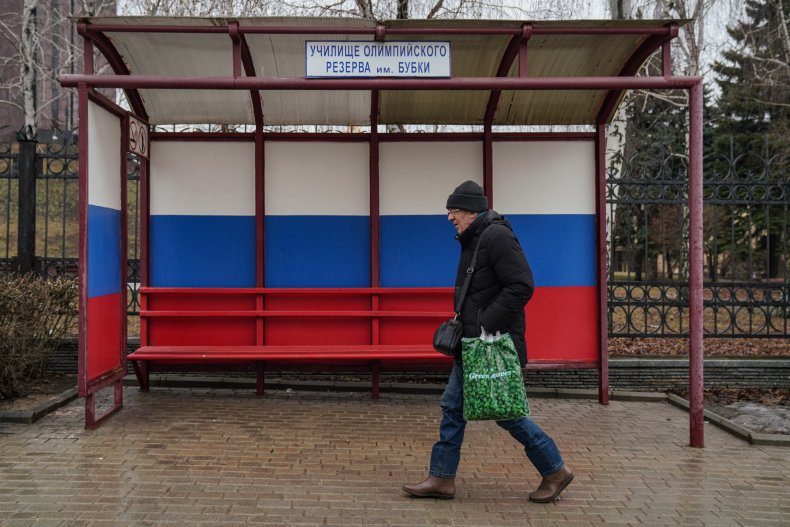 Ukrainian residents of Mariupol are seen carrying on with daily life on the damaged streets on February 26, 2023. The devastated city is a key part of the land bridge between Russia and Crimea established by Russia's full-scale invasion of Ukraine.CEMAL YURTTAS / DIA IMAGES VIA GETTY IMAGES
Ukrainian residents of Mariupol are seen carrying on with daily life on the damaged streets on February 26, 2023. The devastated city is a key part of the land bridge between Russia and Crimea established by Russia's full-scale invasion of Ukraine.CEMAL YURTTAS / DIA IMAGES VIA GETTY IMAGESRecently, Zelensky aide Andrii Sybiha said Kyiv might be willing to re-open peace talks with Moscow once Ukrainian troops arrive on Crimea's doorstep after a future counteroffensive in the south.
"The prevailing way of thinking is that Crimea will be a specific point at which we'll have to think twice," Prystaiko said. "I like the idea that the east is not an issue—we will have to free it. When we come to the point of liberating Crimea, we will think twice."
"By the way, this again can all be part of the fog of war," the ambassador added. "Maybe we will attack Crimea first, because everybody is expecting us to go to the east."
Ukraine's Spring Counteroffensive
Polls indicate that the Ukrainian public is firmly in favor of continued defense, and against territorial or political concessions, in hope of a peace that few believe would prove permanent. Public opinion of the war, Prystaiko said, "differs very much from region to region." Those who are being bombed or have been forced to flee their homes might be more willing to make some kind of peace, he explained.
But peace is not in the offing.
Ukrainian troops have spent the winter training—some abroad—on new NATO weapons systems to prepare for the spring push. All the while, their comrades in the east have withered under intense Russian attacks in hotspots like Bakhmut, Vuhledar, and Kreminna. It is thought to have been a costly winter for both sides, though neither is publishing casualty figures.
"I understand from my contacts within the higher echelons of military power in Ukraine that losses are high, but not as high as the Russians," Prystaiko said. "It was a clever move on our side not to advertise our losses," he added. Historically, Ukraine is a smaller nation than Russia, even if very big by European standards."
"Ukrainian lives cost much more," the ambassador said. "That's actually a weakness when you deal with an enemy like Russia, which doesn't care."
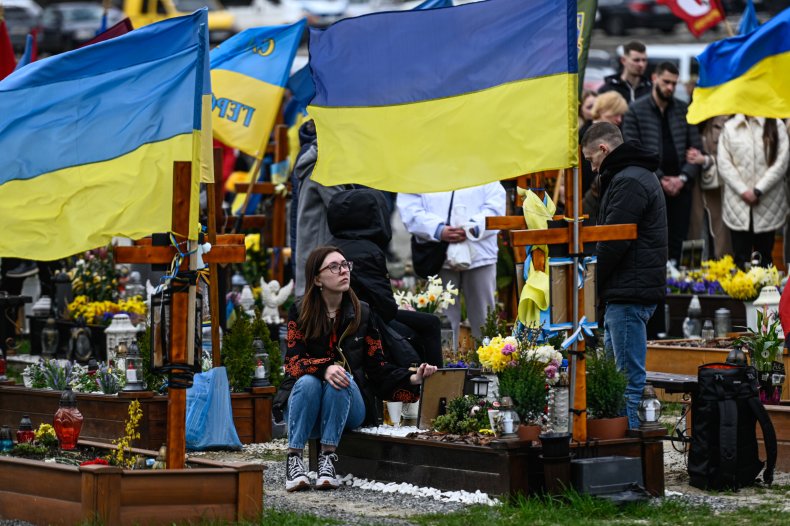 A woman sits by the grave of a relative who died fighting against the Russian invasion during the Orthodox Easter Sunday at the field of Mars on April 16, 2023 in Lviv, Ukraine. Ambassador Vadym Prystaiko says losses have been high on both sides.OMAR MARQUES/GETTY IMAGES
A woman sits by the grave of a relative who died fighting against the Russian invasion during the Orthodox Easter Sunday at the field of Mars on April 16, 2023 in Lviv, Ukraine. Ambassador Vadym Prystaiko says losses have been high on both sides.OMAR MARQUES/GETTY IMAGESUkrainian commanders, Prystaiko said, are moving away from the Russo-Soviet doctrine of mass attacks with mass casualties. "We have to put the survival of a particular soldier at the top, and battle effectiveness second," he said. "I believe that our own soldiers never expected we would put so much on their lives, each and every one of them."
Prystaiko has spent time with Ukrainian soldiers training on British bases. "I am quite happy with their training here," he said. "The numbers will rise. I know that we have to prepare these people. And I hope some of them survive."
There is no letup in the brutality of the fighting. This month, a video emerged purportedly showing fighters with Russia's Wagner Group—a private military company owned by oligarch Yevgeny Prigozhin that has been recruiting from Russian prisons—decapitating a Ukrainian prisoner of war.
Wagner Group resorting to desperate measures to make up for losses
"There are some people who were surprised," Prystaiko said. "I'm not surprised, if you allow people to leave these jails—even serial killers—and you give them Kalashnikovs and tanks."
Ukraine is hoping that Western weapons, particularly main battle tanks, will give its troops the edge in the fighting to come. But political and military leaders have been frustrated by the slow pace of discussions and deliveries, and the relatively low numbers of tanks committed.
"It's very difficult from the Ukrainian point of view," Prystaiko said. "Everything could be done better and faster.
"Talking about this offensive, we will need more than this limited number. Our chief of defense asked for 300, and we have around 130. If everybody's putting so much hope on this counteroffensive, why don't we all invest in this heavily? [...] If we decide that the success of next wave of reinforcing Ukraine will depend on how far Ukrainians will go now, why don't you give us a bit more?"
The aid deliberations are guided by political will and material capability. Both are less robust than what Kyiv wants, and—Prystaiko said—risk the kind of frozen conflict that would only benefit Putin.
"If we make it through now, it will be easier for you," he said. "You won't have to explain to your own people why you're in a yearslong effort when prices are going up due to inflation and all of these other things."
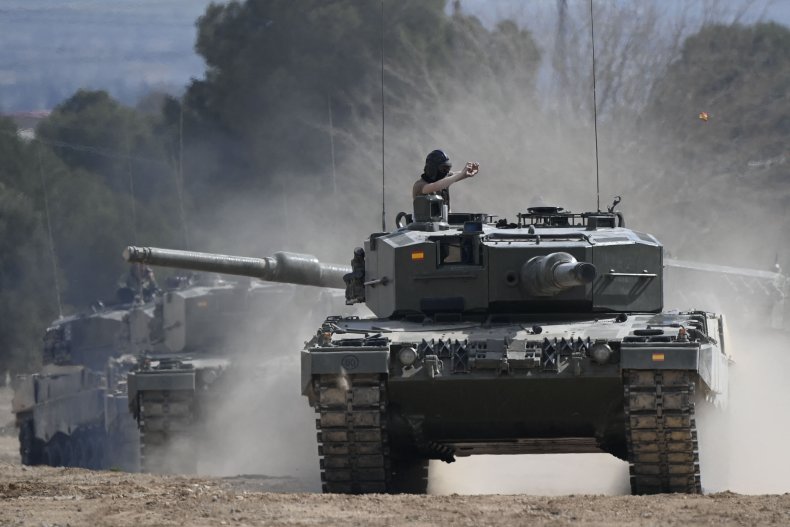 Ukrainian military personnel receive armoured manoeuvre training on German-made Leopard 2 battle tanks at the Spanish army's training centre of San Gregorio in Zaragoza on March 13, 2023. Ukrainian commanders have received fewer tanks from NATO allies than they asked for.OSCAR DEL POZO/AFP VIA GETTY IMAGES
Ukrainian military personnel receive armoured manoeuvre training on German-made Leopard 2 battle tanks at the Spanish army's training centre of San Gregorio in Zaragoza on March 13, 2023. Ukrainian commanders have received fewer tanks from NATO allies than they asked for.OSCAR DEL POZO/AFP VIA GETTY IMAGESSome Western nations—like the U.S. and Germany—publicly debate new weapons systems for months, at times even bouncing each other into new commitments. Others, like France and Italy, ship arms more quietly. While the former approach is politically vital, it does also show Ukraine's hand, Prystaiko said.
"Do we have to, each and every time, prepare the Russians for what we are doing?" he asked. "We have 14 tanks, which is good, but we don't have anything in the air. The Russians know it too. So, they won't waste their resources on anti-air, they will waste their resources only on reinforcing and mining everything they can."
"We tend to publicize each and every move. The Germans are providing so much river crossing equipment and heavy engineering equipment. Thank you. But the Russians now know how many bridges we can build."
Cautious Optimism
Ukraine's last counterattacking phase—in which Kyiv's troops executed a surprise lightning offensive in northeastern Kharkiv Oblast and then liberated the southern city of Kherson—stunned the Russians and buoyed Western allies.
There is no guarantee Ukraine can repeat such a feat. Kyiv faces warier, more entrenched Russian troops and plenty of the geographical challenges that always shape military operations. "The Russians are learning from their experiences," Prystaiko said. The Kharkiv blitz, he said, "was perfect preparation, we should be proud of it."
"Now we have to invent something better than that."
With so much attention now on Ukraine's coming counteroffensive, it is easy to forget how perilous the country's position appeared in the early hours of February 24, 2022. Then, as missiles rained down on Kyiv and Zelensky's security team prepared to face down Russian kill teams in the capital, many observers expected a rout.
Ukraine surprised the world in surviving, and went on to confound expectations with successive battlefield victories.
"We've achieved so much already," Prystaiko said, looking to—as he said—"inject some optimism" into what remains a difficult situation. "This is important for foreign partners and Ukrainians too."
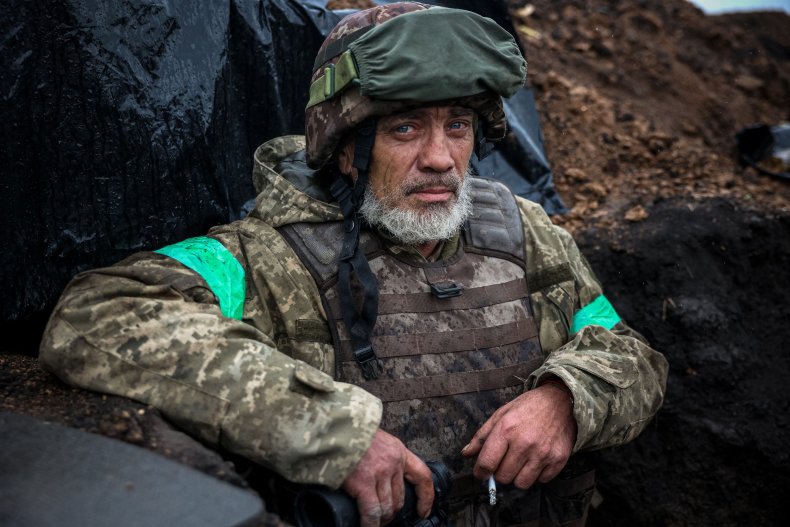 A Ukrainian infantryman of the 57th Separate Motorized Infantry Brigade smokes a cigarette in a trench at an undisclosed location near the frontline town of Bakhmut, Donetsk region, eastern Ukraine on April 13, 2023. Ukraine's troops have confounded expectations with a number of battlefield victories.ANATOLII STEPANOV/AFP VIA GETTY IMAGES
A Ukrainian infantryman of the 57th Separate Motorized Infantry Brigade smokes a cigarette in a trench at an undisclosed location near the frontline town of Bakhmut, Donetsk region, eastern Ukraine on April 13, 2023. Ukraine's troops have confounded expectations with a number of battlefield victories.ANATOLII STEPANOV/AFP VIA GETTY IMAGES"We are now talking about the Ukrainians being able to crush the Russians. If I was talking about this a year and a half ago, no one would take it seriously. The 'second biggest army' or whatever, a huge nuclear state, a UN Security Council member; and now you are talking about a much smaller nation—16 times smaller—without your boots on the ground and us able to defeat them?"
"We survived as a nation with our own foreign policy agenda. We're talking now about EU and NATO membership much easier than we did in peacetime."
"In a way, even if we lose these areas for the time being, we managed the most important part, to remain Ukraine as we see it: Western-oriented, democratic. We're not perfect, everybody knows that."
"They decided to squash us totally, and it never happened. Now we're talking about whether we have Bakhmut. Ask Ukrainians, they will say they had never heard of Bakhmut. And the Russians have been fighting for six months to take this town of 30,000 people. Ukraine is 40 million people. This is a tiny place. We're losing people, it's tragic. But it's not that important."
"Even if we're not achieving in this particular offensive, people have to understand that we not only survived, we're actually dictating the terms to these same Russians. I don't understand why people do not see the beauty of it, especially in the West."
Newsweek has contacted the Russian Foreign Ministry by email to request comment.
No comments:
Post a Comment